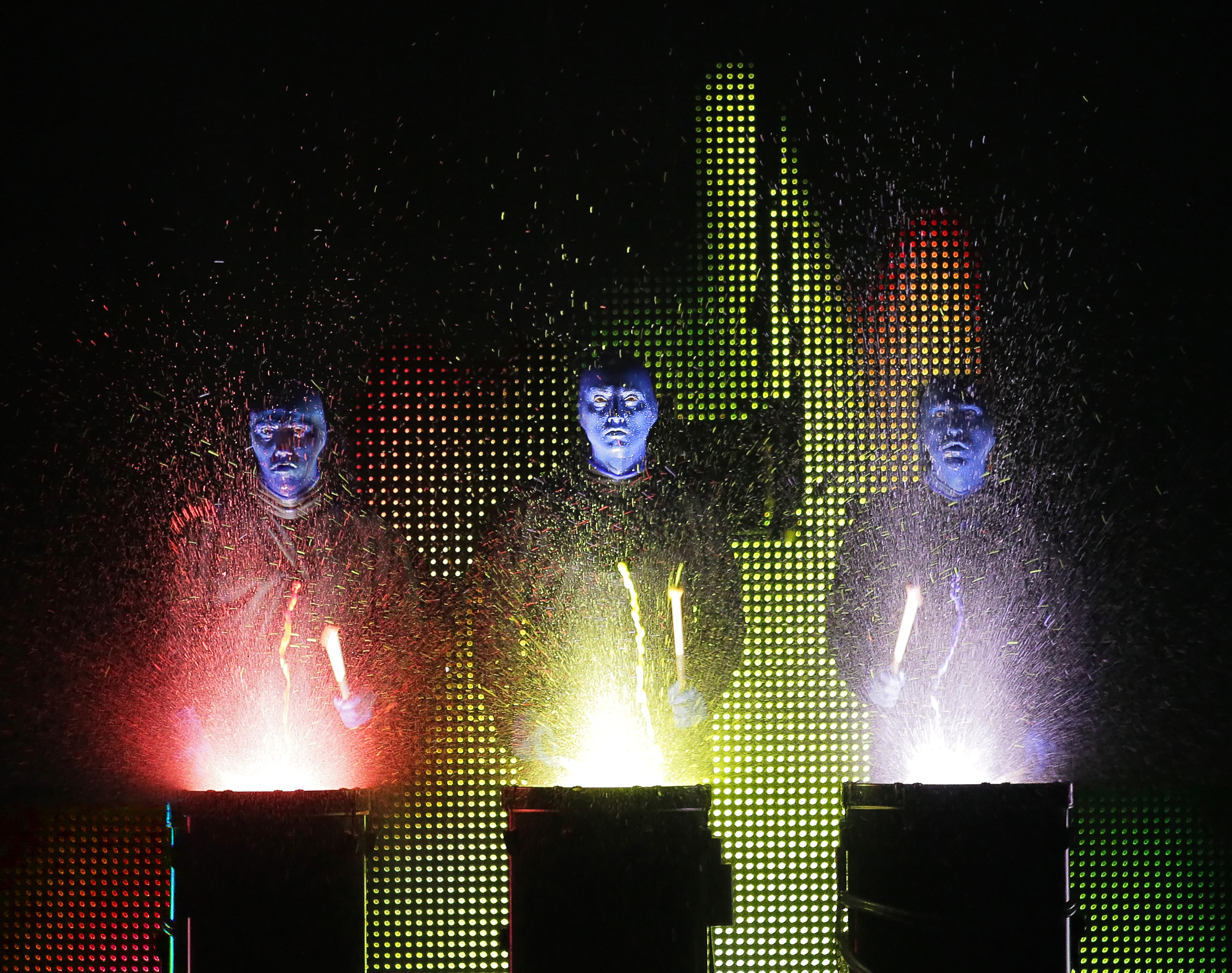“I’m not an athletic person,” said Wade Elkins with a wry smile from the sunlit, dusty corner of his dressing room, a narrow but comfortable space at the Briar Street Theatre in Belmont, just a few El stops away from Northwestern. “I was never good at basketball or baseball – all the things where you had to aim.”
Stop by the Briar Street on any given weekend, and you’d never believe him. There, Elkins performs dazzling physical feats on a regular basis as a Blue Man, one of the many mime-like musicians who compose the critically-acclaimed Blue Man Group. And while Elkins makes everything from furious drum numbers to catching a bucketload of marshmallows in his mouth look easy now, the perfection in his performance has been a long time coming.
“During training, I would have nightmares about throwing and catching all the time,” said the tall, wiry actor with a laugh. “It infected my dreams and my thoughts throughout the day. It was a lot.”
Elkins, 32, spent seven-and-a-half years pursuing musical theater in New York, where Blue Man was founded, before joining the organization's ever-expanding network of performers. Though incredibly rewarding, he says his personal journey to the blue-and-black ensemble was at once “stressful and involved.”
“It’s an initial audition followed by two full days of callbacks,” he said. “And then you’re invited to train. It’s two months of training and it’s still considered part of the audition process. You can be cut at any time.”
Those who complete the standard training can still be moved to different cities under continued supervision or a limited contract, but Elkins believes a chance to work with the group in any capacity is a privilege.
“Even for the people that don’t make it all the way through the audition and training process, you still learn so much,” he said. “You get to experience so many cool things, however far you make it. It’s pretty exciting.”
Elkins has become a sort of Blue Man pro having worked with the group for two years both here in Chicago and abroad on the Norwegian Epic cruise line. While the organization's programs vary from venue to venue, Elkins says the blend of physical slapstick and intense, eclectic musical performance is always present and still takes a heavy toll, even on a veteran like himself.
“It’s so physically demanding that throughout the week I have to go to yoga and Pilates classes,” Elkins said. On top of the standard 30-minute drum warm-up and 45-minute throwing-and-catching sessions, Elkins says he adds about an hour of physical therapy to his daily routine to keep in proper Blue Man form, making for “quite a lot of practicing.”
However, this type of arduous rehearsal is necessary for developing an easy rapport with both the other Blue Men – there are typically three onstage at a time, and they never speak – and the many stage hands and crew who run the complicated tech behind the scenes, which includes everything from expensive LED rigs to old-fashioned hand cranks.
“There’s no coded system to our communication,” said Nykol DeDreu, the production stage manager at the Briar Street. “You just get used to them listening and communicating non-verbally.”
DeDreu, 39, explained how the Blue Men stay synchronized through in-ear monitors that serve as internal metronomes, allowing for on-the-fly improvisation and spontaneity within the boundaries of the show’s video and performance-driven narrative.
“We’re pretty much given the freedom to go off the script as much as we want. We’re encouraged to never do the same show twice,” said Elkins, though he only improvises “as much as the audience demands.” “It’s fun and it’s scary, and you just have to trust that the other guys are with you. You have to be on the ball the whole time.”
While a Blue Man show is powered by participation – two of the Chicago show's best sketches require audience volunteers – Elkins says being a part of the group also provides an anonymity that’s totally unique to the typically ego-driven theater world. Taking off the skull cap and the hard shade of primary blue paint, the actor is almost never recognized after a performance, but he’s come to see that as a liberty and a valuable asset to his Blue Man character.
“As a Blue Man, you are putting on a mask, but it’s also giving you the opportunity to take off your cultural mask, the mask that we wear in our day-to-day lives in order to survive,” Elkins said. “You can totally inhabit where you are in the moment and let it be raw and live. And that’s pretty wonderful.”
As Elkins continues to polish his performance, he encourages others seeking a spot in the coveted group to let go of any inhibitions and act with an independence and authenticity that’s all their own.
“Don’t be afraid to be vulnerable. Just be yourself and quirky and fun,” he said. “Let your freak flag fly.”
